As a Live365 broadcaster, you're covered by our music licenses with ASCAP, BMI, SESAC, and SoundExchange in the U.S., SOCAN and Re:Sound in Canada, and PPL and PRS for Music in the U.K. While these cover approximately 95% of all commercially produced music, our music licensing does not enable us to cover truly independent artists. However, it is still possible to play independent music on your Live365 station. How? Let's talk about it.
What is independent music?
Independent music is music produced independently from commercial record labels or their subsidiaries.
With that said, there are also some other instances of the word "independent" in music that are worth noting. In the music industry, artists are often labeled "independent" if they're not signed to one of the three major labels: Sony, Warner, or Universal. However, although an artist might not be signed to one of the "Big Three," that doesn't automatically make them an independent artist. Additionally, some genres use the word "independent," such as indie rock or indie pop, to indicate an alternative style and tone within the broader genre. But, that doesn't mean every song in those genres is independent music.
Despite the different usages of the word "independent" in music, truly independent music is music produced, published, and distributed without the help of major record labels or their subsidiaries, and the music has not been submitted by the artist to the Performance Rights Organization (PRO) to be covered or represented by them.
How can I play independent music on my Live365 station?
If you receive written permission from an independent artist directly to use their tracks on your Live365 station, then they effectively are allowing you to play their songs without expectations of royalty compensation.
As mentioned though, the term "independent music" can be vague. So, if you would like to play independent music on your station, it is crucial that you acquire written permission from the artist to play each and every independent track that you add to your library. This way, even if you're unsure whether an artist is truly independent or not, you can be sure that your use of the song is legal no matter what.
How can I invite independent music submissions?
Some independent artists may reach out to you with music submissions via your contact email or social media. In this case, it is up to you to decide if you want to accept submissions. If you do, in some instances, artists may provide written permission in their original contact, whereas others may not. So, you'll want to ensure that you ask for written permission to use their track(s) on your station, if permission isn't already provided.
In other instances, you might find an artist that you believe is independent and you may want to play their track(s) on your station. If so, you should reach out to them via social media or email to ask for written permission. And, this may even open up an opportunity for a new relationship and for you to receive the artist's new tracks as soon as they come out.
If you'd like to specifically invite independent music submissions, you might consider starting an email address (ie. [email protected]) to receive submissions at. Then, you can promote the email on your social media, website, etc. to make it clear that you are actively accepting submissions. From there, you can listen through submissions and ask for written permission for tracks that you want to play on your station, if permission isn't already indicated.
If you decide to play independent music on your station after receiving permission, don't forget to let the artist know! The artist may want to let their fans know that your station has their track in rotation, meaning you could get some free promotion in the process. And, even better, you might develop a really cool working relationship with an artist you're proud to support.
Note: The Performance Rights Organizations that we have licenses with also have reciprocal agreements with international PROs. This means that it's also fine to play foreign music on your Live365 station.
Disclaimer: This blog post is not intended as legal advice. Please consult with qualified professionals if you have specific questions about copyrights and licensing.
See how many stations have joined the Radio Revolution at https://live365.com/listen. Keep up with the latest news by following us on Facebook (Live365 Official and Live365 Broadcasting) and Twitter (@Live365 and @Broadcaster365)!
Article Image: ArturVerkhovetskiy via DepositPhotos.

